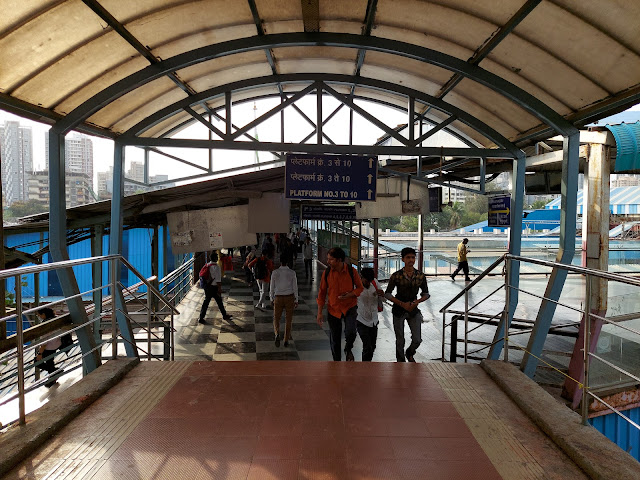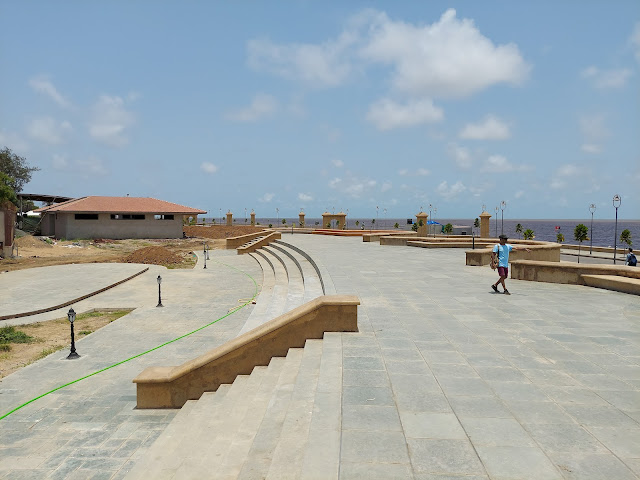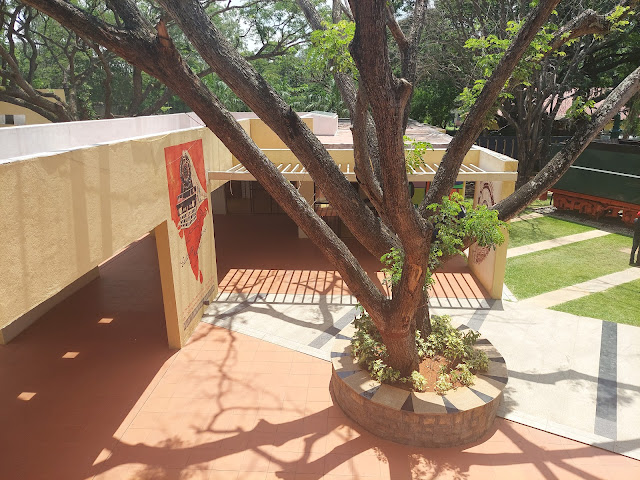दीदी दीदीला मी फक्त तीनदा भेटलो. पहिली भेट नम्रतामुळे शक्य झाली. तिचे हे ऋण फेडता येणे शक्य नाही. पहिल्याच भेटीत दिदीला दिलेला बांबू पाउच दीदी 20 मिनिटे न्याहाळत बसली. एकेक वीण कशी आहे हे डोळ्यांनी आणि स्पर्शाने अनुभवत होती. "This is beautiful"... प्रत्येक डिटेल पाहिल्यावर ती हे एकच वाक्य बोलत होती. मग मी, लक्ष्मी आणि दिदीने जेवताना येथेच्छ गप्पा मारल्या. शाश्वत वास्तुकलेचा भक्कम पाया रचणारी दीदी आम्हाला मात्र एखाद्या नवख्या विद्यार्थ्याप्रमाणे मातीच्या बांधकामाचे प्रश्न विचारत होती. मातीची बोटल टेस्ट कशी करतात हे तिने मला शिकवायला सांगितलं. मी बॉटल टेस्ट करत असताना दीदी बारकाईने पाहत होती, आणि मध्ये मध्ये लक्ष्मीला सांगायची-" हे बघ लक्ष्मी, आपण इथेच चुकलो". दिदींसारख्या ऋषितुल्य वास्तुविशारदाने स्वतःची चूक इतक्या सहज पणे मान्य करणे माझ्यासाठी अविश्वसनीय होते. लक्ष्मी मला नेहमी सांगायची-" दीदी जागी असली म्हणजे ती काहीतरी काम करत असणार, आराम करणं तिला जमायचेच नाही". मी दिदीला एकदा म्हंटल- दीदी, जरा विश्रांती घेत जा"- त्यावर ती हसून म्हणायची - प्रतीक, किती गोष्टी बाकी आहेत, किती घरे बांधायची आहेत, मातीच्या बांधकामाचा प्रसार करायचा आहे, सोलर चुलीची माहिती लोकांना द्यायची आहे, भारतीय स्वयंपाकावर पुस्तक लिहितेय.. कितीतरी deadline आहेत, आणि माझं वय बघता त्या खरोखरच deadline आहेत". ती असे बोलताच मी आणि लक्ष्मीने एकमेकांकडे पाहिले. मृत्यूला दिदीने फार आधीच स्वीकारलं होत. मृत्यूबद्दल ती फार सहज बोलून जायची. आणि आपल्याकडे असलेला ज्ञानाचा वसा जास्तीजास्त लोकांना मिळावा म्हणून ती सतत आपल्या विचारांचे रेकॉर्डिंग करायची. तिच्या बागेतील प्रत्येक झाडाला ती स्पर्श करायची. कोणत्या झाडाला किती पाणी द्यावे, किती खत द्यावं हे फार बारकाईने पहायची. तिची बाग नेहमीच अगदी तिला हवी तशी व्यवस्थित असायची. निसर्गावर दिदीचे इतके प्रेम होते की दिदीच्या बागेत निसर्गही दिदींच ऐकायचा... दीदी सांगेल तस वागायचा... दीदी बरोबर झालेल्या तीनही भेटीत आम्ही कधी वास्तुकलेबद्दल बोललो असू असं आठवतच नाही. दिदीसाठी वास्तुकला ही जगण्याचा भाग होती. दिदीने वास्तूला व्यक्तिरुप दिल होत. घर म्हणजे व्यक्तीच. घर निर्जीव नसतेच. ती घराच्या आणि घरातल्या व्यक्तींच्या नात्याला अनन्यसाधारण महत्व देते. तिच्या मते घरालासुद्धा स्वभाव असतो. घरातला प्रकाश , खोली, वारा ह्यावर तो स्वभाव अवलंबून असतो. अभिकल्प कागदावर रेखाटताना दिदीला पाहणे म्हणजे पर्वणीच. मायकलांजेलो मूर्ती बनवताना किंवा तानसेन गाताना असाच मग्न होत असेल का ? दीदी घराची निर्मिती ह्याच तन्मयतेने करायची. मध्येच लक्ष्मीकडे पाहून बोलायची-" ह्या खिडकीतून सूर्य इथे जमिनीवर येईल आणि संध्याकाळ होई पर्यंत इथून तिथे लहान मुलासारखा घरात बागडेल". दिदीने वारा, प्रकाश ह्यांना घरात बागडायला भाग पाडले. अशी एखादी कल्पना तिच्या डोक्यातून कागदावर आली की तिला होणारा आनंद पाहण्यासारखा. दीदीच्या घरात पहिल्यांदा प्रवेश केला तो स्वयंपाकाच्या वस्तूंनी आणि भांड्यांनी गजबजलेल्या स्वयंपाकघरातून. बंद कपाटे दिदीच्या घरात नाहीच. तरी प्रत्येक वस्तू जागच्याजागी. ह्यावर दीदी म्हणते- "आपण जेव्हा एखाद्या व्यक्तीला भेटतो, तेव्हा ती व्यक्ती संकोच न करता, मनात काहीही लपवून न ठेवता आपल्याशी बोलू लागली की आपण त्या व्यक्तीशी जोडले जातो. घराचेही तसेच आहे. माझ्या घरात जे आहे ते उघड आहे. त्यात काहीच लपवलेले नाही. ते पारदर्शी आहे". दीदी हे सारं काही इतकं सोप्प करून सांगते. घर बांधताना घर बांधणाऱ्याने मातीला स्पर्श करणे , मातीला समजून घेणे महत्वाचे हे ती आवर्जून सांगते. दीदी म्हणायची - " इथली लोक सिमेंटला मसाला बोलतात, त्यामुळे बांधकामात सिमेंट मसल्याप्रमाणेच वापरायचं, आपण जेवण फक्त मसाल्याने बनवत नाही ना. नुसता मसाला खाणे आरोग्याला चांगलं नाही.. आणि मसाला नाही वापरला तरी चालेल की, कधी कधी फळे, फळभाज्या आपण कच्च्या खतोच ना, आणि ते आरोग्याला सुद्धा चांगलं असत... मातीचसुद्धा तसंच आहे"... दीदी हे खोल ज्ञान इतकं सोपं करून सांगते की ऐकणाऱ्याला ते नुसतं समजत नाही तर ते त्यांच्यात खोलवर रुजत. दिदीच्या बोलण्यात एक आध्यात्मिकता होती. ज्यामुळे तिला ऐकणं हा एक सुखद अनुभव असायचा. "प्रतीक, तुला माहीत आहे मला माती का आवडते ? ..ती सुकायला वेळ लागतो. मग ती सुकेपर्यंत तू त्यावर हात फिरवून त्याला आकार देऊ शकतो. तुझ्याकडे नेहमीच थोडा जास्त वेळ असतो. सिमेंटसारखी ती लगेच सुकून टणक होत नाही." दिदीचे हे मृदामय विचार मनाचा ठाव घेतात. दिदीबरोबर शेवटची भेट 2019 च्या उन्हाळ्यात झाली. मी अचानक जायचे ठरवले. काही पूर्वकल्पना न देताच दिदीच्या घरी धडकलो. दीदी नेहमी प्रमाणे लक्ष्मीला एका घराचे डिटेल समाजावत होती. मला अचानक पाहून दीदी खूप खुश झाली. नुकत्याच झालेल्या निवडणुकीच्या निकालाने ती निराश होती. मी येताच ती म्हणाली- " बर झालं तू आलास प्रतीक, तुला पाहिलं की खूप हायस वाटत. तुम्हीच ह्या देशाला योग्य दिशा देऊ शकता. तुम्हाला असं काम करताना पाहिलं की वाटत आता मी कायमस्वरूपी विश्रांती घेऊ शकते". दीदी जेव्हापण असं बोलायची, तेव्हा हृदयाचा ठोका क्षणभर चुकायचा. दिदीला प्लास्टिक जराही आवडत नाही, पण चॉकोलेट फार आवडायचे. चॉकोलेट प्लास्टिक च्या वेष्टनात येते म्हणून तिला खूप वाईट वाटायचे. एकदा कुडाच्या भिंतीचा विषय निघाल्यावर तिनेच मला सांगितलं- " प्रतीक, मला चॉकोलेट खूप आवडतं, त्याचे प्लास्टिक मी जमा करून ठेवते आणि कुडाच्या भिंतीमधील कॅव्हिटी मध्ये इन्सुलेशन म्हणून वापरते". हे सांगताना ती खट्याळ हसते. तिला माहीत आहे की प्लास्टिकच्या पुनर्वापराचा हा अगदी योग्य पर्याय नाही पण त्यातल्या त्यात तिने चॉकोलेट खाण्याचा पर्याय शोधलेला असतो त्याचा आनंद. दिदीच्या स्वभावातील बालपण कधी संपले नव्हतेच. दीदीने एकदा चर्चा करता करता अचानक सांगितले-" प्रतीक, तुम्ही तुमच्या भागातल्या आदिवासी घराच्या कुडाच्या भिंतींचा अभ्यास करा, त्याचा प्रसार करा, कुडाच्या भिंती बांधण्याचे तंत्रज्ञान जिवंत राहायला हवे." दीदी हे सहज बोलून गेली. पण हा आयुष्यभराचा कानमंत्र आहे हे मला आणि शार्दूलला समजले. दिदीच्या बागेत बसलो असताना, दिदीला समजले की मी माझ्या बासऱ्या घेऊन आलो आहे, तिने लागलीच मला बासरी वाजवण्याची विनंती केली. खरंतर मी शिकाऊ बासरी वादक, तरीही ती डोळे मिटून मी जे काही वाजवतोय ते ऐकत होती. त्या दिवशी रात्री मला बसने दिल्लीला निघायचे होते. भुकेल्या पोटी जाऊ नकोस असं म्हणून दीदी स्वतः स्टूल घेऊन स्वयंपाक घरात बसली आणि चार पराठे माझ्यासाठी बनवले. फडताळावरची स्वतः बनवलेल्या प्लम जॅम ची बाटली काढून माझ्याकडे दिली. त्यावेळी निघताना माझी मनःस्थिती फार द्विधा झाली होती. जावेसे वाटत नव्हते. पराठ्यांची पिशवी हातात धरून मी दिदीच्या पाया पडून निघालो. 5 जुलै माझ्या आईचा वाढदिवस. दुपारी आईला ओवाळून शुभेच्छा देऊन मी ट्रेकसाठी शार्दूलच्या गावी निघालो. दुपारी डोंगरावर चढतानाच दीदी गेल्याची बातमी आली आणि सगळं सुन्न झाले. दिदीच वय झालंय हे मान्य होत पण तरीही अशी बातमी पचवणं शक्य नव्हतं. दिदीला परत एकदा भेटायचं होत. तिच्याकडून जगण्याची कला शिकून घ्यायची होती. दिदीच्या जाण्याने नक्की काय झाले? लाखो पुस्तकांच्या ग्रंथालयाला आग लागून ते बेचिराख झालं तर काय होईल ? त्या ग्रंथालयाच्या ग्रंथातील ज्ञानाचे काय होईल ... दीदी असेच एक ग्रंथालय होती. दिदीच्या संपर्कात आलेल्या कित्येक व्यक्तींनी ह्या ग्रंथालयालतील काहीसे ग्रंथ वाचले असतील. त्यातूनही काहीश्या पानांचा बोध त्यांना झाला असेल.. पण तरीही ह्या ज्ञानाचे पावित्र्य इतके गहिरे आहे की त्यातून केवळ चांगल्याचीच निर्मिती होणार. तिच्या हाताखाली तयार झालेले वास्तुशिल्पी अनुज्ञा, लक्ष्मी आणि अमोल सारख्या वास्तूविषारदाचे काम पाहिले की ह्याची प्रचिती येते. दिदीच्या जाण्याने समाजाचे, ह्या जगाचे काय नुकसान झाले आहे हे समजावणे कठीण आहे. निसर्गकेंद्रीत वास्तुकलेतून जीवनाचे मर्म सांगणारा ... आम्हा सारख्या नवोदितांना ह्या ज्ञानमार्गाची दिशा दाखवणारा एक ध्रुवतारा क्षणात नाहीसा व्हावा .. असे काहीसे झाले आहे ... ही पोकळी भरून निघणे केव्हाही शक्य नाही. दीदी जिथे कुठे असेल, तिथेही स्वर्गाची निर्मिती करण्यात दंग असेल..... प्रतीक धानमेर | Didi I met Didi only three times. The first meeting became possible because of Namrata. I shall remain indebted to her. In the first meeting itself, Didi kept gazing at the bamboo pouch I gave her for almost 20 minutes. She was experiencing each and every weave with her eyes and touch. On seeing every detail, she was just repeating one phrase: “This is beautiful…” Then Didi, Laxmi and I gossipped sumptuously over lunch. The woman who has laid the most promising foundations was asking us questions about mud construction like a fresh student. She asked me to teach her how to test terracotta bottles. She observed me carefully as I performed the test, and would keep telling Lakshmi, “See Lakshmi, this is where we went wrong.” A masterful architect to the likes of Didi acknowledging her mistake so graciously was unbelievable for me. Lakshmi would often tell me, “If Didi is awake, she must certainly be doing some work, resting is not her cup of tea.” Once, I told Didi, “Didi, you must rest a little.” To which, she would smilingly reply, “Prateek, so many things are yet to be completed, so many homes to be made, mud construction has to be popularized, people have to be told about solar cooker, I am writing on Indian kitchens…there are so many deadlines, and at my age these deadlines have implications. As she said this, Lakshmi and I looked at each other. Didi had accepted mortality long ago. She would speak of death with utter simplicity. And so that more and more people could take advantage of her knowledge, she would keep recording her thoughts. She would touch each tree in her garden. Which tree needs how much water, fertilizer - she would observe carefully. Her garden was always organized precisely in the manner she wanted. Didi loved nature to an extent that it was always generous on her garden. It would obey Didi’s instructions… In my three meetings with Didi, I don't remember talking specifically about architecture. Architecture was innate to her living. Didi had personified architecture. Building is a body. It is a living entity. (It isn’t a dead entity). She gives immense importance to the house and the relationships between those living in the house. According to her, a house also has behaviour. It depends on the light, rooms, wind within the house. To see Didi draw her designs on the paper was almost a blessing. Perhaps Michalengelo, while making his sculpture or Tansen while singing his tune might be equally immersed? Didi would construct the house with equal measure of dedication. Promptly, she would turn to Lakshmi and say, “The sun will come here from this window, and by the evening, hop into the house from here to here like a small child.” Didi has brought wind and light in a happy interplay within the house. Any such idea translating from her mind onto the paper would bring her joy that was worth watching. I first entered Didi’s house in the liveliness of her kitchen-wares and utensils. There are no closed cupboards in Didi’s house. Still everything is in its place. She says, “When we meet a person, if he/she is able to express to us what is in their mind without any hesitation, we feel connected to them. Houses are just like that. Whatever I have in my house, is all open. There is nothing to hide. It’s all transparent.” Didi is able to say all this in such a simplified manner. She emphasizes how important it is for the maker of the house to touch and learn the mud with which it will be built. She used to say, “People here call cement as ‘masala’ (mixture), therefore they use it in construction too as ‘masala’. We don’t make food only with ‘masala’, do we? Just eating masala is not good for health. And it is also okay to not use any masala; sometimes we eat fruits, vegetables raw, which are also good for our health. It’s just like that for mud!” Didi is able to share this deep knowledge in such simple words that it is not just comprehensible but also takes deep root in the listeners’ minds. There was a kind of spirituality in Didi’s words, which made listening too a pleasant experience. “Prateek, do you know why I like mud? It takes time to dry. Until then you can mould it. You always have a little more time at hand. It does not dry and harden immediately like cement.” Such fertile thoughts get seeded in the subconscious. My last meeting with Didi happened in the summer of 2019. I just decided to go suddenly. I reached Didi’s house without a warning. Like always, Didi was lovingly explaining the details for a house to Lakshmi. On seeing me suddenly, Didi felt very happy. She was disappointed with the recent elections. As soon as I arrived, she said, “I am glad you came, Pratik, seeing you brings me relief. It is you all who can give this country the right direction. When I see you all working like this, I can now rest permanently.” Whenever Didi used to speak like that, one’s heart used to skip a heartbeat for a moment. Didi disliked plastic to the core, but loved chocolates. She used to feel very guilty about the fact that chocolates are wrapped in plastic. Once while speaking of local wall building technique, she herself told me, “Pratik I really like chocolates; I collect its plastic wrappers and (will) use it as insulation within the cavities of these walls.” She naughtily chuckles while saying this. She knew that this is not the best way to recycle plastic, but having found an immediate solution to her guilt of having the chocolate (and thereby the wrapper) gives her satisfaction. The child in Didi’s behaviour was ineffable. Once while conversing, Didi suddenly said, “Pratik, you all must study the wall construction techniques of the adivasi houses in your region, disseminate the knowledge, the technology of karvi-wall construction must remain alive.” Didi spoke this away quite simply. But this is a life long secret, this Shardul and I understood. While sitting in Didi’s garden, as she understood that I have brought my seat, she asked me promptly to play the flute. Honestly, I am still a learner, still she would close her eyes and listen to whatever I was playing intently. That night I had to take a bus to Delhi. That I must not go hungry, she herself took the stool into the kitchen to make me four parathaas. She pulled out the bottle of plum jam made herself from the fruits and handed over to me. I was in a strange mood while leaving that time. I did not feel like going. I picked up the pouch of parathaas, touched Didi’s feet and left. Every 5th July is my mother’s birthday. After wishing my mother in the afternoon, I left for Shardul’s village for a trek. The news of Didi’s passing away came while we were still climbing the mountain and everything became numb. Although she had grown old, it was difficult to digest this news. I wanted to meet Didi once more. I wanted to learn the art of living from her. What precisely happened from the passing away of Didi? What will happen if you burn away a library filled with a lakh books? What will happen to the knowledge in the books of that library? Didi was one such archive. The many who came in contact with Didi must have read several of these books. From those too, they might have extracted only some amount of learning. But still, the purity of that knowledge is so deep that it will certainly give rise to good design. The architects who got trained under her - namely the works of the likes of Anugya, Lakshmi and Amol are no less than works of masters themselves. It is difficult to explain what loss the society and world will suffer at large on the passing away of Didi. It is something like the disappearance of a guiding star that demonstrates the meaning of life through environmentally oriented architecture… that which leads emerging practitioners like us in this very direction…this vacuum is impossible to fill up. Wherever Didi might be, she will gleefully immersed in the creation of paradise. By Prateek Dhanmer Translated by Anuj Daga Inputs by Milind Mahale |






















































